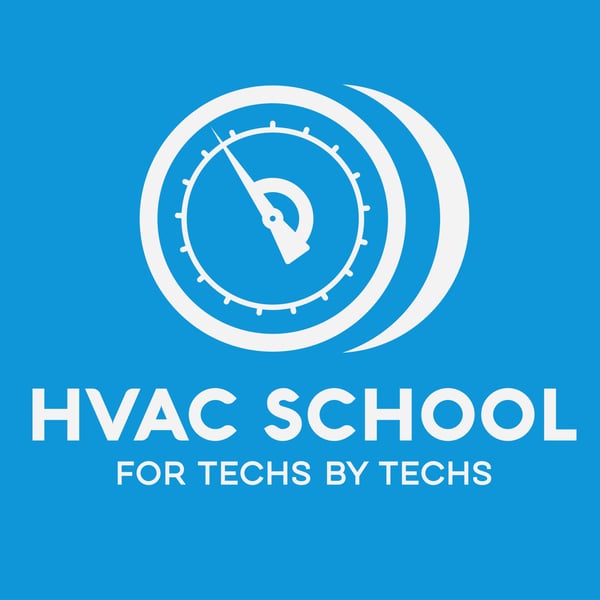How do Inverter Air Conditioners Work? - Short #201
HVAC School - For Techs, By Techs
Bryan Orr
4.8 • 985 Ratings
🗓️ 9 July 2024
⏱️ 11 minutes
🧾️ Download transcript
Summary
In this short podcast episode, Bryan answers a listener-submitted question: How do inverter air conditioners work?
Inverter-driven systems have variable capacity to match loads. We can provide cooling or heating BTUs to match the needs of the space without overcompensating or undercompensating and causing temperature swings. Load matching also helps us get better efficiency out of the system. High-humidity climates also benefit from load matching, as equipment doesn't dehumidify well unless it has been running the entire time.
When set up and designed properly, variable frequency drives (VFDs) improve comfort, efficiency, and even dehumidification. You can "overclock" your compressor to get more BTUs out of it without oversizing, particularly when you have high heating loads due to the cold weather.
Inverter-driven equipment takes AC power in, runs it through a rectifier circuit, and turns it into rough power that resembles DC power. The current is then smoothed out and goes through the inverter bridge circuit. Unlike an analog AC wave, we rely on pulse-width modulation (PWM) to simulate three-phase power and control the motor speeds according to a space's needs.
We typically troubleshoot residential inverter-driven equipment by following the manufacturer flowcharts and possibly by communicating with tech support. Commercial VFDs are external to the motors and tend to be a bit more universal rather than manufacturer-specific.
Watch the livestream about VFDs & inverters with Matthew Taylor and Corey Cruz HERE, and you can also watch the livestream about cold climate heat pumps with Ross Trethewey and Russ King HERE.
Learn more about NCI's High-Performance HVAC Summit at https://www.gotosummit.com/.
Have a question that you want us to answer on the podcast? Submit your questions at https://www.speakpipe.com/hvacschool.
Purchase your tickets or learn more about the 6th Annual HVACR Training Symposium at https://hvacrschool.com/symposium.
Subscribe to our podcast on your iPhone or Android.
Subscribe to our YouTube channel.
Check out our handy calculators here or on the HVAC School Mobile App for Apple and Android.
Transcript
Click on a timestamp to play from that location
| 0:00.0 | Yep, yep this is the HVAC school podcast. I'm Brian. This is a short episode in which we're going to talk about inverters. |
| 0:10.0 | I've got a question about inverters. So I'm going to do my best to give a pretty simple |
| 0:16.0 | answer. But before we do that let's thank our great sponsors. carrier and carrier.com |
| 0:22.2 | carrier has been a long-term sponsor of the podcast. |
| 0:25.0 | They've made it possible very early on for us to do what we do and they are the products that we sell day in a day out. |
| 0:31.0 | Everything from single stage equipment all the way up to the green speed |
| 0:34.8 | extreme one of the most efficient products on the market today. Find out more |
| 0:39.8 | about what carrier has to offer and about becoming a carrier dealer by going to carrier.com. |
| 0:46.0 | Refrigeration Technologies at Refrigerate.com |
| 0:50.0 | The Esco Institute and the HVACR Learning Network. |
| 0:55.0 | Our friends Howard and Jerry Weiss, Jason Objute, Eugene Silverstein, Clifton Back, all great guys who are huge advocates for the industry are working hard to provide |
| 1:04.8 | industry leading online content for HVACR professionals. |
| 1:08.6 | Visit HVACR dot E- Learn network to access reliable up-to-date and relevant digital resources and even earn |
| 1:18.0 | continuing education hours. Enhance your knowledge today with HVACR learning network from the Esco Institute. |
| 1:25.8 | As always find out more by going to Esco Group.org. |
| 1:30.0 | We did a live stream on YouTube with Corey Cruz and Matthew Taylor where we talked about variable frequency drives and inverters. |
| 1:38.0 | We also did another one on cold climate heat pumps. If you want a more detailed conversational version, go watch one of |
| 1:44.7 | those. Those are great on YouTube, H-F-C-School YouTube channel. But I'm going to just give an overview and |
| 1:50.1 | we'll start with the why because this is the main question that a lot of times people are asking when they ask about inverted driven |
| 1:55.0 | Air conditioners why do we want to use inverted driven in the first place and what does that mean? |
| 2:00.0 | So we want to have variable capacity to the extent that it allows us to |
| 2:05.1 | load match. What does load match mean? It means that we can provide cooling or heating BTUs that |
... |
Please login to see the full transcript.
Disclaimer: The podcast and artwork embedded on this page are from Bryan Orr, and are the property of its owner and not affiliated with or endorsed by Tapesearch.
Generated transcripts are the property of Bryan Orr and are distributed freely under the Fair Use doctrine. Transcripts generated by Tapesearch are not guaranteed to be accurate.
Copyright © Tapesearch 2025.

